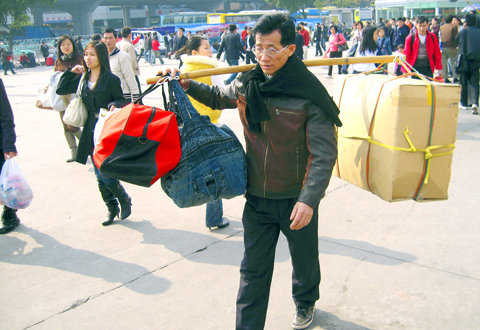Some hefted their luggage on bamboo shoulder poles. Others carried their things in plastic buckets. All were migrant workers hurrying to get home on Thursday before the Lunar New Year festival — a holiday that triggers one of the world’s biggest annual migrations of humans.
Although the celebration is more than two weeks away, the travelers had to get an early start in a country where 188 million people — more than the population of Russia — were expected to squeeze onto trains during the hectic season.
Many workers were forced to go home even earlier this year because their factories went belly up or their assembly lines were idle amid the global economic crisis.

PHOTO: AP
“Last year, I went back home five or six days before the holiday started. This year, I’m going back about 20 days earlier,” migrant Huang Mingren said as he waited for his train.
For Huang and many others, the trip begins at the crowded station in Guangzhou, the capital of Guangdong Province, often called the world’s factory floor because it’s China’s key manufacturing base.
This is where a huge number of China’s 160 million migrant workers churn out Nike shoes, iPods and Nokia mobile phones.
“Lots of factories have been closing. The toy factory I was working at is about to go under, so the boss just told us to leave early,” said Huang, a wiry 32-year-old native of central Hunan Province.
Many migrants also hit the road early because they were worried about the weather. Last year, ice storms paralyzed the transport system in southern China during the peak holiday season, forcing millions to delay or cancel their plans. About 200,000 were stranded at Guangzhou’s station and spent nights outside in a freezing drizzle.
The Lunar New Year, which begins on Jan. 26, is the biggest holiday in China, much like Christmas in the West. For most migrants, it’s the only time they can leave the mind-numbing drudgery of their factory jobs to go home to see their parents, spouses and children.
They enjoy family dinners, exchange gifts and relax for about a month.
Before the festivities begin, the migrants must endure the journey home. There will be 2 billion trips by road and 24 million plane trips. Last year, traffic accidents killed 7,179 people and injured 35,879 across China during the 40-day holiday period, the Ministry of Public Security said.
In the freezing square outside Beijing’s train station, migrant Zhang Suqiong said she would return to the city to look for work after the holiday. But she wasn’t optimistic.
“I’m nervous about 2009 because I don’t know how we’ll make money,” said Zhang, a construction worker from Sichuan Province, which was struck by a monster earthquake last May that killed 70,000 people.
In Guangzhou, holiday travelers flowed into the train station’s massive plaza around the clock. Since the station isn’t big enough for the crowd, the travelers are only allowed to enter in waves shortly before their trains depart. Most spend hours — sometimes days — waiting outside in large holding areas made of tall metal barricades. No seats are provided, so many just stand or sit on newspapers and straw mats on the cold concrete.
There was an atmosphere of hurried desperation as people pushed through the crowds, searching for the ticket office or the line for their train. Loudspeakers barked a constant cacophony of warnings and directions. Groups of three or four travelers put their bags in piles, guarding them from thieves who have long made Guangzhou’s stations one of the dodgiest.
Police wearing riot helmets and carrying megaphones shouted at the travelers, “Get in line!”
One migrant meekly tapped an officer on the shoulder and asked for directions. The policeman spun around and yelled through the megaphone just inches from the man’s face: “Go over there!”
Some travelers pulled fancy new suitcases on wheels, while others carried red plaid nylon bags, fertilizer sacks tied to bamboo shoulder poles or buckets stuffed with the essentials for a two or three-day journey: soap, wash cloths, toilet paper, metal tea cups and snacks of peanuts, crackers and instant noodles.
Migrants have a reputation for being gullible and they’re often the targets of scam artists in China’s predatory society, which is awash with fake train tickets and counterfeit cash.
Local newspapers have been filled with stories and warnings about rip-offs. Some cheats sell “VIP cards” that are supposed to allow travelers to enter the train station early. Others dress up as health inspectors and charge travelers for physical exams they say are mandatory.
Many travelers were already worrying about hunting for jobs after the holiday.
About 600,000 migrants left Guangdong Province last year because of plant closures, said Huang Longyun (黃龍雲), a vice governor, at a briefing on Thursday in Beijing. About 62,400 enterprises closed — about 4,740 more than the year before, he said.
“With this horrible economy, everyone around is worried about getting laid off or finding a new job,” said Zhang, the construction worker in Beijing. “Things have not been good since the Olympics and the future looks dark. Many of our relatives and friends have been laid off.”

DEADLOCK: Putin has vowed to continue fighting unless Ukraine cedes more land, while talks have been paused with no immediate results expected, the Kremlin said Russia on Friday said that peace talks with Kyiv were on “pause” as Ukrainian President Volodymyr Zelenskiy warned that Russian President Vladimir Putin still wanted to capture the whole of Ukraine. Meanwhile, US President Donald Trump said that he was running out of patience with Putin, and the NATO alliance said it would bolster its eastern front after Russian drones were shot down in Polish airspace this week. The latest blow to faltering diplomacy came as Russia’s army staged major military drills with its key ally Belarus. Despite Trump forcing the warring sides to hold direct talks and hosting Putin in Alaska, there

North Korea has executed people for watching or distributing foreign television shows, including popular South Korean dramas, as part of an intensifying crackdown on personal freedoms, a UN human rights report said on Friday. Surveillance has grown more pervasive since 2014 with the help of new technologies, while punishments have become harsher — including the introduction of the death penalty for offences such as sharing foreign TV dramas, the report said. The curbs make North Korea the most restrictive country in the world, said the 14-page UN report, which was based on interviews with more than 300 witnesses and victims who had

COMFORT WOMEN CLASH: Japan has strongly rejected South Korean court rulings ordering the government to provide reparations to Korean victims of sexual slavery The Japanese government yesterday defended its stance on wartime sexual slavery and described South Korean court rulings ordering Japanese compensation as violations of international law, after UN investigators criticized Tokyo for failing to ensure truth-finding and reparations for the victims. In its own response to UN human rights rapporteurs, South Korea called on Japan to “squarely face up to our painful history” and cited how Tokyo’s refusal to comply with court orders have denied the victims payment. The statements underscored how the two Asian US allies still hold key differences on the issue, even as they pause their on-and-off disputes over historical

BEIJING FORUM: ‘So-called freedom of navigation advocated by certain countries outside the region challenges the norms of international relations,’ the minister said Chinese Minister of National Defense Dong Jun (董軍) yesterday denounced “hegemonic logic and acts of bullying” during remarks at a Beijing forum that were full of thinly veiled references to the US. Organizers said that about 1,800 representatives from 100 countries, including political, military and academic leaders, were in Beijing for the Xiangshan Forum. The three-day event comes as China presents itself as a mediator of fraught global issues including the wars in Ukraine and Gaza. Addressing attendees at the opening ceremony, Dong warned of “new threats and challenges” now facing world peace. “While the themes of the times — peace and development —